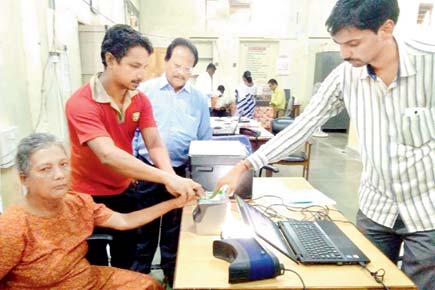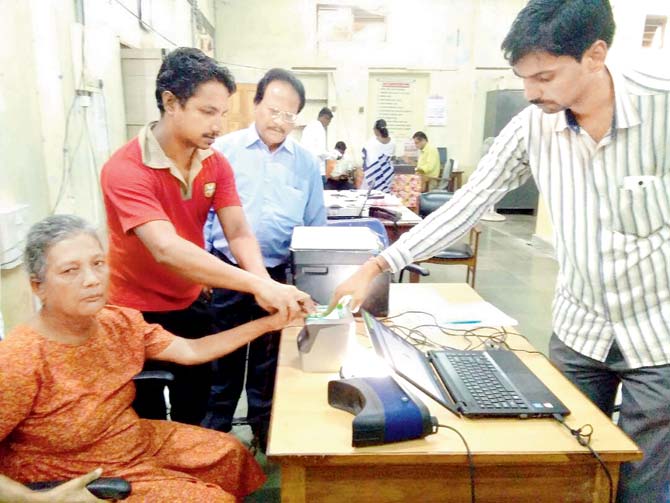In a one-of-its-kind camp for mental health patients at the Ratnagiri regional hospital, 45 get Aadhar cards with aid from medical superintendent Dr Vilas Bhailume


A patient finishing up formalities for Aadhaar card with the aid of medical superintendent Dr Vilas Bhailume (in the blue shirt) at the Regional Mental Hospital in Ratnagiri
ADVERTISEMENT
Here's a doctor going beyond the call of duty. Dr Vilas Bhailume is the medical superintendent of the Ratnagiri Regional Mental Hospital, but continuing in a vein similar to his stint at Pune, he is attempting to give an identity to those patients who have none and while at it, get them enrolled for Aadhaar so they can avail benefits afforded to those with the government identity card.
Speaking to mid-day, Dr Bhailume said, "I have around 45 unidentified patients (29 females, 16 males) between 40-90 years old with psychiatry problems admitted here. Some of them have been at the hospital for five years, some 50 years, but seldom has anyone come to meet them. Hence, I decided to get their name enrolled for Aadhaar so they would be on the government records at least."
Camp held
Bhaimule added, "I was corresponding with collector P Pradeep, who agreed to the idea and gave the necessary instructions to ensure that the Aadhaar team would visit the hospital and help in finishing the formalities. Finally the camp was held earlier this week."
Explaining the process, he said, "When unidentified patients are brought to the hospital, usually found by the police loitering on the roads, we give them a pseudonym based on certain identifiers like the region they were found in or their physical attributes. That is the name that we are using on the Aadhaar cards for these 45 patients and the address for them will be the hospital. Thus, this will become their permanent identity." However, he clarified, "If and when their relatives are traced, necessary changes upon verification will be made to this document."
Counting your successes
He added, "We have recently managed to trace the family of a 45-year-old woman patient, who hailed from Tamil Nadu. Now, the attendant will accompany the woman to her relatives, as they are very poor and cannot afford to come to Ratnagiri," the superintendent said.
However, it was not an easy camp to pull off, said Dr Bhaimule, explaining, "Some patients were so restless that our staff had to actually help them in getting their finger prints scanned and ensuring that they kept their head straight while being photographed. Unlike regular
Aadhaar cases, which get recorded in minutes, on an average, here they had to spend over half-an-hour per patient."
But he is no novice to this as he carried out a similar camp in the Pune hospital in 2014. "I had carried out a similar Aadhaar drive for the psychiatrist patients, a first-of-its-kind across India, and had got nearly 150 patients registered for Aadhaar cards."
Authorities heap praise
According to Dr S Raokande, medical superintendent, Thane Regional Hospital, "On an average, nearly 25 per cent of the patients brought in by the police as unidentified and do not speak, as they are usually in advanced stages of their ailments." Dr Sadhana Tayade, Joint Director, Health Services, Maharashtra added, "We have cases in all four hospitals where patients have been staying for over four decades. What we need is active participation from law and judiciary, social welfare, NGOs instead of merely expecting the hospital team to do everything."
Applauding the initiative, Dr Sanjay Kumavat, former deputy director of mental health, Maharashtra, said, "Aadhaar cards for citizens are a basic civic right, irrespective of their physical or mental health. This should be put into practice immediately at all mental hospitals in the state."
 Subscribe today by clicking the link and stay updated with the latest news!" Click here!
Subscribe today by clicking the link and stay updated with the latest news!" Click here!






